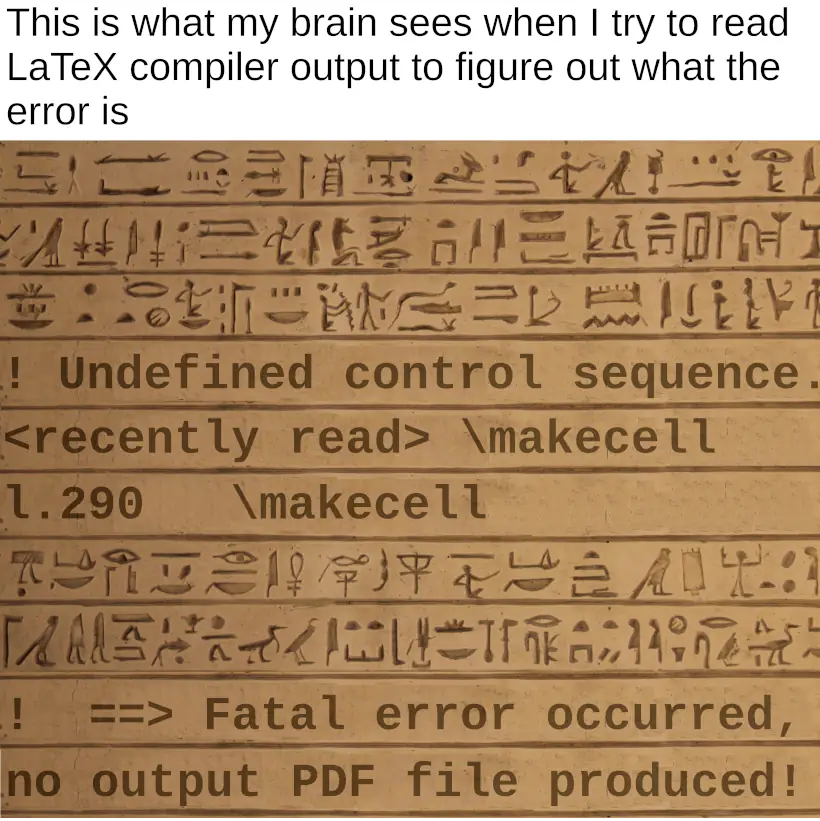this post was submitted on 11 Jul 2024
700 points (98.9% liked)
linuxmemes
21126 readers
890 users here now
Hint: :q!
Sister communities:
- LemmyMemes: Memes
- LemmyShitpost: Anything and everything goes.
- RISA: Star Trek memes and shitposts
Community rules (click to expand)
1. Follow the site-wide rules
- Instance-wide TOS: https://legal.lemmy.world/tos/
- Lemmy code of conduct: https://join-lemmy.org/docs/code_of_conduct.html
2. Be civil
- Understand the difference between a joke and an insult.
- Do not harrass or attack members of the community for any reason.
- Leave remarks of "peasantry" to the PCMR community. If you dislike an OS/service/application, attack the thing you dislike, not the individuals who use it. Some people may not have a choice.
- Bigotry will not be tolerated.
- These rules are somewhat loosened when the subject is a public figure. Still, do not attack their person or incite harrassment.
3. Post Linux-related content
- Including Unix and BSD.
- Non-Linux content is acceptable as long as it makes a reference to Linux. For example, the poorly made mockery of
sudoin Windows. - No porn. Even if you watch it on a Linux machine.
4. No recent reposts
- Everybody uses Arch btw, can't quit Vim, and wants to interject for a moment. You can stop now.
Please report posts and comments that break these rules!
founded 1 year ago
MODERATORS
you are viewing a single comment's thread
view the rest of the comments
view the rest of the comments

The reason is that you're reading TeX, not LaTeX. The latter has abstracted away the fundamental building blocks so few people know how an hbox is set anymore. So, an hbox is a box where the content is in horizontal mode. Between the things is glue. Glue can stretch and shrink. Depending on how you have set your tolerance and penalties, there's a maximum percentage of stretch allowed. If the glue stretches more, it becomes bad, this is called badness and can effectively be up to 10000 bad. So why not just put more things into the box? Well, (La)TeX probably tried to do that, but came up with worse badness. TeX always chooses the least bad option on a paragraph level. In practice, the usual suspect is often that you have something else that can't fit the last part of a line, like a really long word. If you can look at it and manually hyphenate it, things might be better.
gotta love these units
https://www.youtube.com/watch?v=OYt1kqDNlMY
Most probably a narrow column with a word near the end that TeX had problems hyphenating.
A line of text is basically a hbox. The words in this line are fixed in their lenght, so TeX distributes the space between them as evenly as possible to fill this hbox. It has a certain range for the length of a space, and tries to move words or parts of words with hyphenation around to stay in the OK range for the space width. If it can't, it complains about under- or overfull hboxes.
I ran into this issue when using code blocks in LaTeX that contained a bash command like ‘echo aBcdEF32… > /var/www/index.php’, where aBcdEF32… was the base64 encoded string of a web shell. I wound up having to set the line break behavior to split on some random letters/numbers to get everything to wrap appropriately, although that was probably some hacky heretical solution.
You could have used a thin space every four or eight hex digits, showing that it is not really a space but making it easier to read.
But you cannot blame TeX for not being able to break such a construct.
Oh I don’t blame it at all, I totally realize I threw a weird edge case at it! If it sounded like I was slagging TeX I didn’t mean it that way at all.
Ironically the tom7 video about it using an AI to rewrite text to look prettier was the first time I learnt what badness and text layout in TeX actually meant.
https://youtu.be/Y65FRxE7uMc
Thank you for this writeup, very informative. I get a lot of these "badness 10000" messages when working with things that have "complex" layouts, for example a resume/CV template. Given that TeX was originally made for research papers/articles, it makes sense that weirdness would arise when it's used for more layout-heavy stuff!
Badness 10000 usually indicates that something is very wrong. Usually overfull hboxes. If the text is spaced out to the point where it immediately looks bad, that could still be like badness 5000. What I have seen mostly is macros not playing well with other macros, and in LaTeX there's a lot of macros under the hood, so it's very hard to troubleshoot.